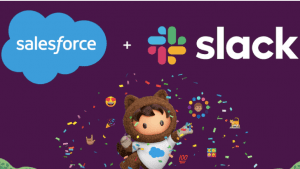

Marc Benioff, Chair and CEO, Salesforce commented: “Stewart and his team have built one of the most beloved platforms in enterprise software history, with an incredible ecosystem around it. This is a match made in heaven. Together, Salesforce and Slack will shape the future of enterprise software and transform the way everyone works in the all-digital, work-from-anywhere world. I’m thrilled to welcome Slack to the Salesforce Ohana once the transaction closes.”
To pay for the acquisition, Salesforce has obtained a commitment for a $10.0 billion senior unsecured 364-day bridge loan facility, subject to customary conditions from Citigroup Global Markets Inc, Bank of America, N.A. and JPMorgan Chase Bank, N.A. The interest rate was not declared.
Why Slack
The acquisition will enable Salesforce to replace Chatter as the interface of choice for many users. Interestingly it means that Salesforce + Slack is potentially doing what it accused Microsoft of doing earlier this year. Slack accused Microsoft of bundling Teams with its office products and called on European regulators to investigate in July.
Ironically Salesforce is now likely to bundle Slack across all of its Salesforce Clouds. this will see it compete head to head with the combination of Dynamics CRM and Teams. Salesforce confirmed that Slack will become the interface of choice for every Salesforce Cloud across Salesforce Customer 360.
Dan Brown, Chief Product and Strategy Officer, FinancialForce, who once worked at Microsoft, commented: “My take on the Salesforce acquisition of Slack is two-fold. It enhances the platform, which is always a bonus for partners, such as FinancialForce. It also improves the platform’s collaboration capabilities, which is critical for any service-economy company, as more work is done cross-functionally. So win-win. Additionally, since FinancialForce already integrates into Slack, we’re in a good spot with our solutions and will likely do more here if Salesforce completes the acquisition.”
Unlike Salesforce Chatter, Slack has an open architecture that already integrates to more than 2,400 applications that people use. Slack bots enable users to leverage those integrations to perform tasks from within Slack but leveraging different applications; this reduces the need to switch windows. As Slack becomes embedded into Salesforce and its ecosystem, it will enable the Salesforce platform to connect to any application. The question is, will Salesforce combine Slack with the Mulesoft Anypoint platform to provide an open and flexible platform that will enable interaction between any application?
Why Salesforce
For Slack, this will open the door to a wider set of enterprise customers who already use Salesforce. It may also help Salesforce where customers are already using Slack. Slack is used by start-ups and enterprises alike and has customers in more than 150 countries. What will be interesting is whether Slack helps Salesforce to penetrate the SME market better.
Stewart Butterfield, Slack CEO and Co-Founder commented: “Salesforce started the cloud revolution, and two decades later, we are still tapping into all the possibilities it offers to transform the way we work. The opportunity we see together is massive. As software plays a more and more critical role in the performance of every organization, we share a vision of reduced complexity, increased power and flexibility, and ultimately a greater degree of alignment and organizational agility. Personally, I believe this is the most strategic combination in the history of software, and I can’t wait to get going.”
It is not believed that Slack opened negotiations with any other potential bidders. Also, with the price set quite high, it seems unlikely that shareholders will object to the acquisition as has happened in other major technology acquisitions recently, such as NetSuite.
Opinions
Enterprise Times received several opinions about the potential acquisition before the new broke. Scott Webb, CEO of Avionos commented: “Its potential investment in Slack shows they understand the way organizations function have changed for the long-haul. Remote collaboration and streamlined communication will be the norm going forward.”
Another insightful opinion was from Dustin Grosse, Chief Marketing and Strategy Officer at Nintex. He commented: “Salesforce acquiring Slack is a bold move in their on-going competition with Microsoft and specifically Microsoft Teams, their platform bet for integrated workforce collaboration and productivity. Slack extends Salesforce capabilities beyond their leading customer relationship management platform into modern collaboration capabilities that will appeal to sellers, marketers, developers, and other departments across many organizations. Remote working has become increasingly important due to COVID-19 this year, and additional real-time communications solutions choices will accelerate how organizations collaborate to solve customer challenges.
“It will be interesting to see how Salesforce key competitors like Microsoft, Oracle and SAP respond to this acquisition. I suspect that low-code digital process automation solutions to drive stronger interoperation between key systems of records like CRM, ERP, HRM, and unified collaboration platforms – like Slack and Teams – will be the next focus area to further improve work by eliminating paper and siloed data systems to streamline and digitally transform how work gets done.”
Enterprise Times: What does this mean?
There is no doubt that this is a massive acquisition for Salesforce. One has to question whether it overpaid for Slack. However, the timing means that it probably needed to. The addition of Slack will enable it to compete head to head with Microsoft. Slack is on an upwards trajectory, and while it has been under pressure from Microsoft, it was still growing. If Salesforce had waited any longer, the price might have been higher. It might also have not been able to leverage the synergy between the two organisations as quickly or as well.
One piece that is missing from the Salesforce armoury is the ERP solution that challenges Dynamics. Salesforce has several ERP solutions on its platform, including FinancialForce. It also integrates to others, such as Workday and Sage Intacct. Can Slack provide the interface and Mulesoft the glue between ERP solutions and Salesforce solutions? Will it enable Salesforce to embrace the hybrid architecture that customers are demanding and compete even more effectively against Microsoft?
There is a lot of information still to come out. How quickly will the solutions be integrated? What will the integration power? How much will it cost? Will there be a benefit for joint customers? And will Slack just replace Chatter without any cost implication? Salesforce will have to recover the costs of this deal somehow.
Another question remains, what will Salesforce do with the Slack ticker? Will it change from “CRM” to “WORK”? Salesforce is now far more than a CRM vendor. While CRM will always be its foundation, its Work.com offering is aligned better with its future.
























